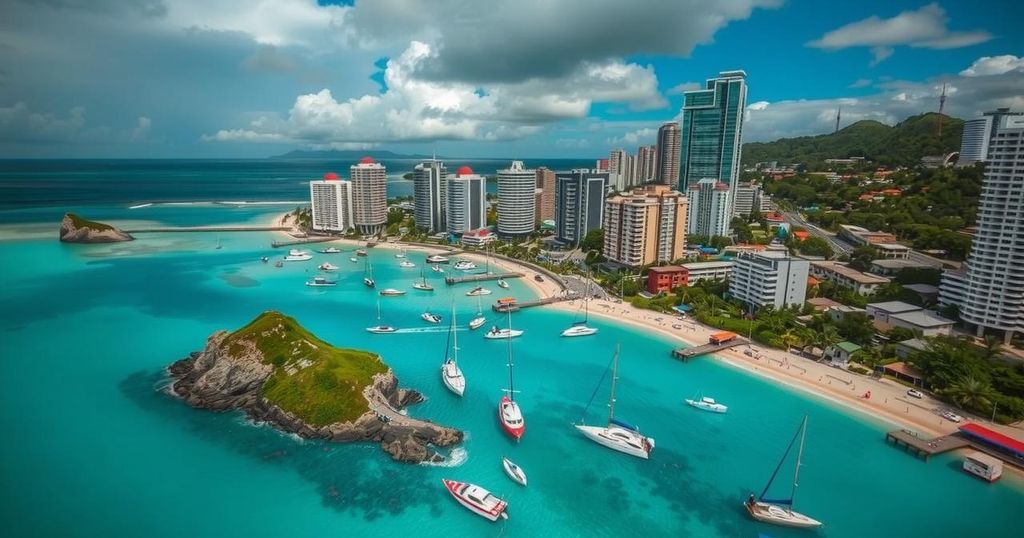World news
AFRICA, AFRICAN UNION, ALLIANCE OF CHANGE, BRITAIN, CHAGOS ISLANDS, DEMOCRACY, DEMONSTRATIONS, GOVERNMENT, INDIAN OCEAN, MAURITIUS, MILITANT SOCIALIST MOVEMENT, NATIONAL ASSEMBLY, NAVIN RAMGOOLAM, OPPOSITION, POLITICS, POPULISM, PR, PRAVIND JUGNAUTH, RAMGOOLAM, SHEILA
Stella Nguyen
0 Comments
Mauritius Parliamentary Elections Amidst Scandal and Political Unrest
Mauritius held challenging parliamentary elections on the backdrop of a phone-tapping scandal, impacting Prime Minister Pravind Jugnauth’s re-election hopes. Voter turnout reached 70% amid security measures and international scrutiny, while concerns of governance and political stability persist. The elections followed a historic agreement over the Chagos Islands, reflecting complex political dynamics in this prestigious African democracy.
Mauritius conducted parliamentary elections amidst a significant political scandal, marking a pivotal moment for the nation known for its democratic stability within Africa. The elections followed a groundbreaking agreement that transferred sovereignty of the Chagos Islands from Britain to Mauritius. However, Prime Minister Pravind Jugnauth’s prospects for re-election were compromised by the leak of secretly recorded conversations involving politicians and journalists, which raised concerns over democracy and civil liberties. The government attempted to impose a social media ban to suppress the scandal but withdrew this action after facing public outcry. The contest for the 70-seat National Assembly unfolded primarily between two factions: the ruling Militant Socialist Movement, led by Jugnauth, and the opposition Alliance of Change, which is headed by former Prime Minister Navin Ramgoolam. Both factions expressed optimism regarding electoral victory, pledging to tackle pressing issues such as poverty and the cost of living. Voter turnout reached 70 percent as the polls closed, with results anticipated the following day. Security was heightened at polling stations, with law enforcement and observers from bodies including the African Union overseeing the electoral process. Ramgoolam raised alarms about potential electoral fraud but noted that the balloting process proceeded relatively smoothly. Jugnauth countered by asserting confidence in his administration’s track record, accusing the opposition of attempting to disrupt the electoral proceedings. In total, there were over one million registered voters in this election, representing an critical juncture for Mauritian democracy. Concerns about the country’s political and economic stability emerged, particularly in relation to good governance. Analysts indicated that the Mauritian economy, though fruitful with a GDP growth of seven percent in 2023, is in need of diversification, and governance issues, including corruption, have intensified. Researchers cited instances of procurement scandals and political harassment as detrimental to democracy. In a noteworthy shift, Mauritius fell to second place in the Ibrahim Index, which assesses governance across Africa. Historically, power in Mauritius has oscillated among three prominent families since its independence. While Jugnauth’s family legacy continues to dominate, Ramgoolam has previously served as Prime Minister, indicating a return to familiar leadership dynamics. A newfound political entity, the Linion Reform alliance, emerged, promoting an anti-nepotism stance. The recently secured Chagos agreement, hailed by Jugnauth as a step towards national decolonization, remains complicated by ongoing U.S. military interests in the region, raising questions about future implications. As the country awaits election results, the stability of Mauritius hinges not only on political outcomes but also on its commitment to uphold democratic principles and address significant socio-economic challenges.
Mauritius is often regarded as one of Africa’s most stable democracies, boasting a parliamentary system established after gaining independence from Britain in 1968. The country has an economy propelled by tourism, financial services, and textiles, achieving notable GDP growth over the years. However, recent political controversies, including scandals and increased corruption, have sparked concerns regarding the integrity of its democratic institutions. The nation’s history of leadership divided among a few influential families reflects an ongoing political dynamics that impact governance and policy. The Chagos Islands sovereignty issue highlights Mauritius’s attempts to assert itself regionally, showcasing both national pride and the complexities entwined with historical colonial legacies.
The recent parliamentary elections in Mauritius served as a litmus test for the nation’s democratic resilience amidst emerging scandals and political maneuverings. As the electoral process unfolded with significant voter engagement, concerns regarding governance, civil liberties, and economic stability remain at the forefront of national discourse. The outcome of the elections may not only shape the immediate political landscape but also influence long-term strategies for addressing corruption and fostering economic diversification in the Republic of Mauritius.
Original Source: www.news-expressky.com




Post Comment